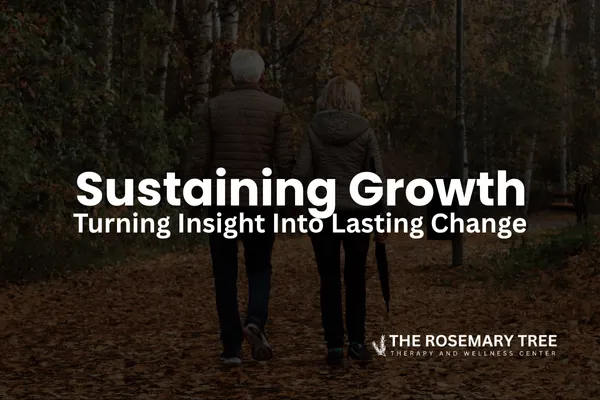
Sustaining Growth: Turning Insight Into Lasting Change
Healing Is a Process, Not a Finish Line
After months of hard emotional work, therapy sessions, and raw conversations, many couples reach a point where things finally feel stable again. The storms have calmed. The communication is stronger. Trust is rebuilding.
And yet, many still ask, “How do we make sure this lasts?”
The truth is, healing isn’t a single milestone. It’s a rhythm, a set of daily habits, choices, and conversations that keep your relationship grounded and growing.
As we explored in Accountability Without Blame, the goal isn’t perfection, it’s progress. Sustaining growth means practicing the same tools that brought you here, repair, balance, honesty, and care, long after the pain has faded.
Why Lasting Change Requires Daily Attention
Healing after betrayal is like rebuilding a home. The initial repairs are vital, but without ongoing maintenance, even the strongest structure can weaken over time.
New habits need reinforcement. Emotional safety needs tending. Connection needs time.
When couples stop nurturing what they’ve built, old patterns can quietly resurface, avoidance, defensiveness, disconnection. The good news is, once you’ve learned to repair and regulate together, you already have the tools to keep your foundation strong.
How to Keep Growth Going After Therapy
Here are practical ways to keep progress alive and real:
Keep Communication Open
Check in regularly about emotions, stress, and needs. Short, honest talks prevent small misunderstandings from turning into distance.Schedule Connection, Not Just Conversations
Make time for shared experiences that rebuild playfulness and joy, walks, meals, or rituals that remind you why you chose each other.Return to Repair Quickly
As discussed in The Power of Repair — How Small Changes Create Big Shifts, every relationship has ruptures. The difference now is how quickly and gently you reconnect afterward.Reflect, Don’t Repeat
When conflict arises, reflect on what has changed since before. Remind each other of how far you’ve come and what new tools you’ve learned.Check in With Support When Needed
Even after therapy, it’s healthy to schedule occasional “maintenance” sessions or join an intensive if life brings new challenges. Growth doesn’t stop, it evolves.
The Role of Accountability in Long-Term Growth
Sustained healing depends on each partner continuing to take right-sized responsibility.
The partner who caused harm keeps showing up with honesty and consistency.
The betrayed partner continues practicing trust and openness, at their own pace.
Both continue owning their triggers, communication patterns, and needs.
Accountability over time becomes second nature, not something forced, but something chosen. It becomes the rhythm of a healthy relationship.
Tying This Back to Safety and Intimacy
In Rebuilding Desire — When Love and Fear Coexist and Creating a New Kind of Intimacy Together, we explored how safety leads to closeness. Sustaining growth means staying attuned to that safety every day.
Even as love deepens, both partners must keep listening, validating, and repairing. Emotional safety is what keeps intimacy alive long-term, not intensity, but intention.
How Accelerated Outcomes Therapy Supports Lasting Change
Our Accelerated Outcomes Therapy Intensives are designed not only for crises but also for couples who want to reinforce and expand what they’ve already built.
In these intensives, couples can:
Revisit growth goals and celebrate progress
Identify subtle patterns that threaten connection
Strengthen emotional regulation and communication tools
Develop a long-term plan for maintaining trust and intimacy
Learn how to keep growth sustainable, even during stressful life seasons
This format gives couples the space to reflect deeply, practice together, and leave with renewed clarity about their next chapter.
When Growth Feels Slower Than Before
There will be weeks when connection feels easier and others when you slip into old habits. This is normal. What matters is how quickly you notice and return to what you’ve learned.
Slow growth is still growth. Every conversation that ends in understanding, every repair made before bedtime, every day you choose patience over anger, all of it reinforces your healing.
The fact that you care enough to sustain growth means you’ve already changed.
Final Thoughts
Healing after betrayal doesn’t end when therapy does. It continues every time you choose accountability, kindness, and connection.
Long-term growth is built on small, daily decisions to communicate, repair, and stay present. Over time, those small choices become the foundation of a new kind of love, one built to last.
If you and your partner are ready to maintain your progress and keep growing together, we would be honored to help. You can reach out to us here, and our team will connect with you to talk about what this process could look like. There is no pressure, only care, encouragement, and continued support for your next season of healing.


